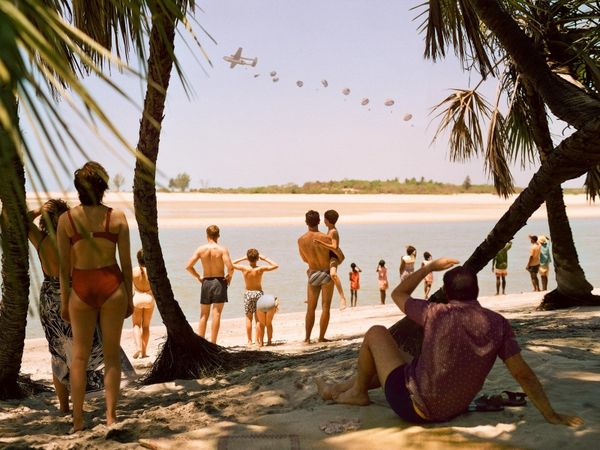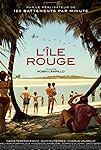Eye For Film >> Movies >> Red Island (2023) Film Review
Red Island
Reviewed by: Amber Wilkinson

Patriarchal and paternalistic structures at both a family and country level are put in the spotlight by Robin Campillo in a story loosely inspired by his own childhood. It’s the early 1970s and though the island of Madagascar became independent a decade before, the French remain a dominant presence. The action unfolds at an air base where youngster Thomas Lopez (Charlie Vauselle) lives with his mum Colette (Nadia Tereszkiewicz), dad Robert (Quim Gutierrez) and his brothers.
We first encounter Thomas as he peeps out from the crate where he is reading his favourite books about masked crime fighting youngster Fantômette - she, in fact, gets her own fantasy sequences in the film, although it is the adults whose features are, tellingly, more fully masked.

“You’re always spying,” his mum tells him later, and it is through Thomas’ eyes that we voyeuristically soak up the details of life on the base, catching things that the adults either don’t see or don’t want to acknowledge. The approach allows Campillo to take a loose and immersive approach to the storytelling as Thomas is privy to things which he doesn’t always fully understand, though we do.
A place described by one of the airmen as “the setting for every pleasure” there’s an almost Bacchanallian feel to life for these expats, whose presence is largely decorative, though they facilitate the local military's crackdown on farmers who mount resistance against the government. Their free time is mostly spent lounging in the sunshine or hosting boozy parties as they try to stave off thoughts of having to the place that ought to be ‘home’. It’s through one of these bashes that Campillo - in true French style - introduces us to his ensemble cast, which also includes the Guedjs (David Serero and Sophie Guillemin) and young newcomers to the island Bernard (Hugues Delamarlière) and Odile (Luna Carpiaux).
It may be considered a paradise but these matches are not made in heaven. Robert’s jealousy emerges in flashes, while Bernard and Odile’s marriage disintigrates. Thomas and his young Vietnamese friend Suzanne (Cathy Pham) race through the compound on their bikes, offering us snapshots of life on the way - a lovers’ tree of bamboo for secret assignations here, soldiers practising how to quell a riot there.
The locals play second fiddle, with local girls expected to know their place - which is, seemingly, as parachute seamstresses or in the local brothels where they should not necessarily expect to be paid. This second-class treatment is emphasised by the character of Miangaly (Amely Rakotarimalala), who enters into a full blown romance with Bernard that is deemed so threatening by the ex-pats that they attempt to exorcise him of it.
The child’s eye view allows the situation to emerge as a sort of collage, often with striking visuals, such as the abstract effect created by glass as he peers into a party, or the way the pattern on an argonite table recalls Madagascar viewed from above. The sound design is also used to unsettle. The creak of the lovers’ tree mirroring that of swing ropes over a branch in Thomas’ garden, suggesting that not everything is as solid as it may look.
Campillo shifts the perspective in the film’s final half hour during a night-time foray for Thomas. He is the one wearing the mask but the fake reality of the camp will soon be stripped away to reveal the islanders’ perspective. “We don’t always pay enough attention,” Suzanne warns her friend. Campillo rewards us if we do.
Reviewed on: 04 Mar 2024
















